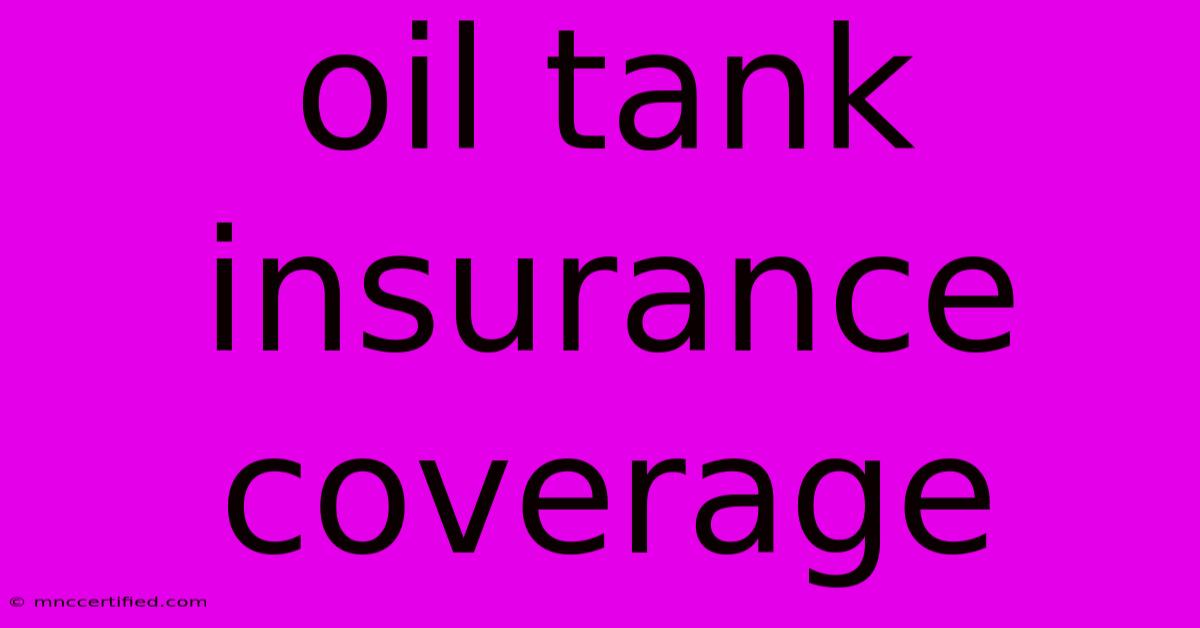Oil Tank Insurance Coverage

Table of Contents
Oil Tank Insurance Coverage: Protecting Your Property and Your Pocketbook
Protecting your home and property from potential environmental hazards is crucial, and that includes safeguarding against oil tank leaks. An oil tank, whether used for heating oil or other fuels, presents a significant risk if it fails. This article dives deep into oil tank insurance coverage, helping you understand what it entails, what it covers, and why it's a vital investment.
Understanding the Risks of Oil Tank Leaks
Before exploring insurance coverage, let's understand the potential consequences of an oil tank leak:
- Environmental Contamination: Leaking oil can contaminate soil and groundwater, leading to expensive cleanup costs and potential legal liabilities. This can affect not only your property but also neighboring properties.
- High Remediation Costs: Cleaning up oil spills is a complex and costly process, often involving excavation, soil removal, and specialized remediation techniques. Costs can easily reach tens of thousands, or even hundreds of thousands of dollars.
- Legal and Regulatory Penalties: Environmental regulations are strict. Failure to properly address an oil tank leak can result in significant fines and legal repercussions.
- Property Damage: Beyond environmental contamination, the oil itself can damage your property, including your foundation, landscaping, and other structures.
What Does Oil Tank Insurance Cover?
Oil tank insurance, often a specialized policy or an add-on to your homeowner's or commercial insurance, typically covers:
- Leak Detection: Many policies cover the cost of detecting leaks, even before visible signs of damage appear. This preventative measure can save you significant money in the long run.
- Remediation Costs: This is the most crucial aspect. The insurance covers the expense of cleaning up the oil spill, including excavation, soil removal, and disposal.
- Legal and Regulatory Expenses: The policy often covers legal fees and expenses associated with complying with environmental regulations.
- Property Damage: Coverage for damage to your property caused by the oil leak, such as foundation damage or landscaping repair.
- Third-Party Liability: In some cases, the policy extends to cover liability if the leak causes damage to neighboring properties.
Types of Oil Tank Insurance Coverage
Several types of coverage may be available:
- Pollution Liability: This focuses on the environmental consequences of a leak.
- Underground Storage Tank (UST) Insurance: Specifically designed for underground tanks, this offers comprehensive coverage.
- Aboveground Storage Tank Insurance: For tanks located above ground, this provides tailored protection.
It’s crucial to carefully review the policy details to understand the specific coverage limits and exclusions.
Why You Need Oil Tank Insurance
The costs associated with an oil tank leak can be devastating. Without insurance, you'll be solely responsible for these potentially enormous expenses. Consider these key reasons to secure oil tank insurance:
- Peace of Mind: Knowing you're protected from unexpected financial burdens provides significant peace of mind.
- Financial Protection: It safeguards your finances from the potentially crippling costs of remediation and legal fees.
- Compliance with Regulations: Many areas require insurance for oil tanks, especially underground ones.
- Protection of Property Value: A leak can significantly diminish your property's value; insurance helps mitigate this risk.
Finding the Right Oil Tank Insurance
Finding the right policy requires careful consideration:
- Assess Your Risk: The age, type, and location of your oil tank will influence your risk profile and the cost of insurance.
- Compare Quotes: Obtain quotes from multiple insurers to compare coverage and pricing.
- Read the Fine Print: Thoroughly review the policy documents to understand the coverage limits, exclusions, and terms and conditions.
- Check for Certifications: Ensure the insurer is reputable and experienced in handling oil tank claims.
Oil tank insurance is a crucial investment for any homeowner or business owner with an oil tank. The potential costs associated with a leak far outweigh the relatively modest cost of insurance. By securing appropriate coverage, you can protect your property, your finances, and your future. Don't wait until a leak occurs; take proactive steps to safeguard your assets today.

Thank you for visiting our website wich cover about Oil Tank Insurance Coverage. We hope the information provided has been useful to you. Feel free to contact us if you have any questions or need further assistance. See you next time and dont miss to bookmark.
Featured Posts
-
Champions League Matchday 12 10 Forecast
Dec 10, 2024
-
Budget Insurance Phone No
Dec 10, 2024
-
Champions League Injury News And Lineups
Dec 10, 2024
-
The Hairy Bikers Festive Feast
Dec 10, 2024
-
Home Insurance In Buffalo
Dec 10, 2024